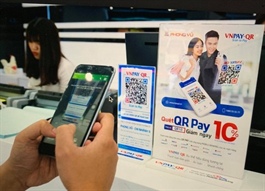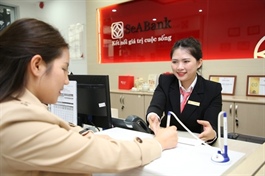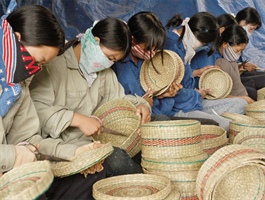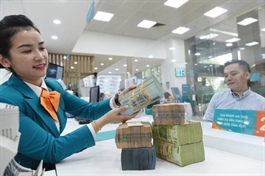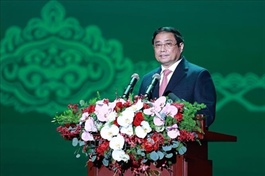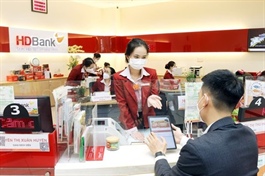Central bank buys US$4 billion of currencies in Q1
Central bank buys US$4 billion of currencies in Q1
Amidst the global uncertainties, the Central Bank has been buying back foreign currencies to ensure an adequate trade balance and economic stability.
The State Bank of Vietnam (SBV) purchased foreign currencies totaling US$4 billion in the year's first quarter to balance economic and trading activities and stabilize the currency market, according to Governor Nguyen Thi Hong.
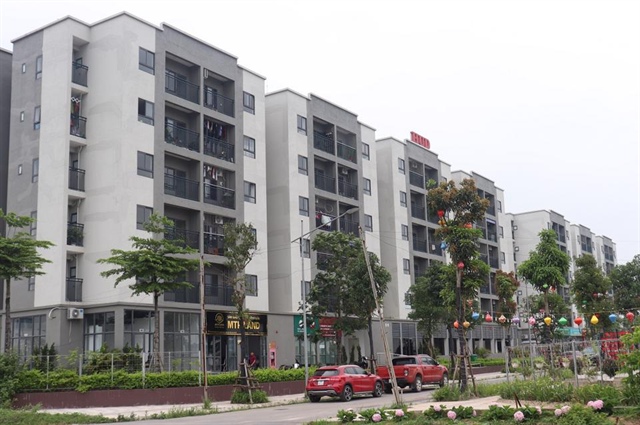
|
Liquidity in the banking sector is abundant, she said, adding that bank savings have risen sharply since the Tet (Lunar New Year) festival.
The SBV has asked commercial banks to ensure their operations and provide sufficient supplies to the people following the recent collapse of US and European banks and the incident at Saigon Commercial Bank (SCB) last year, Hong said.
According to the central bank governor, the Russia-Ukraine conflict, the collapse of some US and European banks, interest rate hikes by the Federal Reserve, and inflation weighed on the global economy in the first quarter.
"Although the uncertainties have not had a strong immediate impact on Vietnam's money market, they will reroute global capital flows. The central bank is closely monitoring them," she told the monthly meeting between the government and local authorities of 63 cities and provinces on April 3.
In January-March, Vietnam's inflation rate was 4.18%, which kept goods and services at affordable price levels for people and businesses, while the banking sector remained stable before the negative news about US and European banks, Hong reported.
But the Vietnamese economy still faces some challenges, such as low GDP growth, declining foreign direct investment (FDI), disbursement of the public investment budget, low credit growth, and weak consumption power, she said.
Debt restructuring and interest rate cuts are among the key solutions the central bank has taken to support credit growth in the country, Hong said, adding that the Vietnamese dong is one of the most stable currencies in the world.
"The State Bank will work with relevant ministries and agencies to amend Circular 16/2021/TT-NHNN, which regulates corporate bond trading for foreign-owned financial institutions," she said.
The amendment is expected to help resolve bond-related issues and ensure the safe operation of the banking system, avoiding more cases similar to those of US and European banks, Hong said.
Regarding the real estate market, as suggested by the International Monetary Fund (IMF), the central bank may allow a third-party unit to participate in the evaluation of real estate projects and enterprises to provide them with the most appropriate solutions, the governor said.
"The IMF advises the central bank to monitor maturity risk closely, as the bond and real estate markets often have long-term maturities with significant inflows."
In late March, Sumitomo Mitsui Banking Corporation (SMBC), one of Japan's top financial institutions, bought 15% of VPBank's capital. "The event proves that foreign investors are still very confident in Vietnam and that the difficulties are only short-term."
At the meeting, Prime Minister Pham Minh urged the SBV and related units to implement effective, flexible, and active policies to boost economic growth and solve urgent banking and economic problems.
The Prime Minister also asked the central bank to find solutions to existing problems with the real estate market, affordable housing projects, corporate bonds, and debt restructuring.
Instruction for affordable housing package
Borrowers must adhere to the requirements of the Ministry of Construction and other laws. A buyer or investor is allowed to apply for a loan once.
The program is available until either full disbursement or December 31, 2030.
Investors will enjoy an interest rate of 8.7% for three years, and buyers will enjoy an interest rate of 8.2% for five years. The rates are 1.5-2% lower than normal levels, and the bank and borrowers will discuss new rates and terms after the preferential periods expire.
The SBV asked the four largest state-owned banks, including Agribank, BIDV, Vietcombank, and Vietinbank, to implement the program immediately. Other lenders must report to the central bank for approval to join the program.



